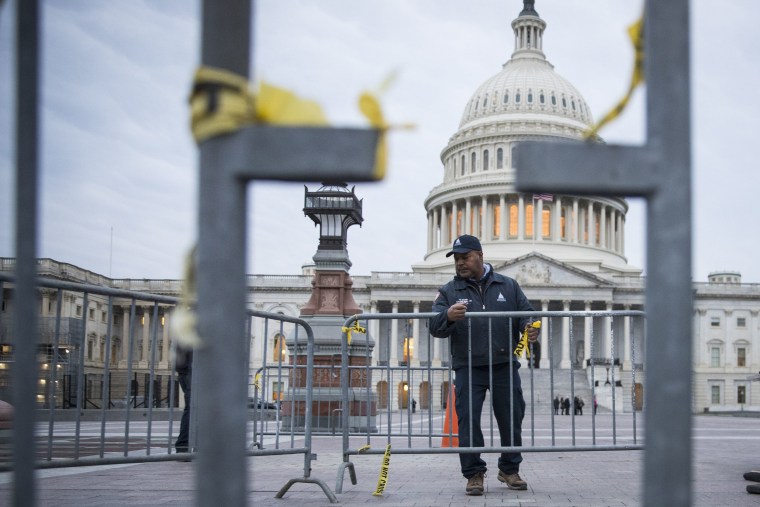WASHINGTON — Angela Vásquez, a maintenance worker at the Department of Agriculture and a single mother of six, says she's perpetually worried these days.
"I’m in this situation right now where I have no money coming in," said Vásquez, a native of Guatemala who has lived in the nation's capital for 26 years.
“I have a lot of bills to pay, including tuition for my son in college," she said. "What am I supposed to tell my kids when they open the refrigerator and there’s no food? I can’t afford to not work."
Vásquez is one of thousands of contract workers losing wages during the nearly monthlong partial government shutdown. Vásquez said she has been looking for another job, but "you don’t get most jobs overnight with an application process and all."
Federal contract workers on the lower end of the pay scale — such as food service and maintenance workers — are being hit hard by the shutdown because they cannot afford to go without wages or lower pay.
The nonprofit advocacy group Good Jobs Nation estimates that more than a million federal contract workers may end up idle or working fewer hours because of the shutdown, and a third of those workers make $15 or less an hour.
Most of the workers on the lower pay scale are Hispanic or other people of color. The federal government does not keep specific figures on the number of contract workers, but a New York University report estimates that they make up more than 40 percent of the total federal workforce — or 3.7 million out of 9.1 million employees.
José Orellana, 52, has worked as a federal contractor for close to 30 years, working three jobs to support his family, including as a full-time cafeteria worker and a part-time maintenance worker in the federal government. Orellana told NBC News he bought a house and a car in the last couple of years and can’t afford to be without those jobs.
“I have a mortgage, car payments, all the bills everyone has, but I have no paycheck. I also have a wife and teenage son in Guatemala that I send money to while we wait for their paperwork to come through to bring them here to the States," said Orellana. "I haven’t seen them in three years and I was planning on visiting them in March, but now I’m not sure I’m going to be able to do that."
He has filed for unemployment to help pay at least some of his bills.
Vásquez and Orellana were among a number of federal government contract employees who made the rounds on Capitol Hill on Wednesday to lobby legislators to reopen the government. “It’s very frustrating and very worrisome. I need to get back to work,” said Orellana.
Contractors face another financial hurdle in that they are not guaranteed back pay when the shutdown does end. Legislation signed this week by President Donald Trump covers only back pay for federal staff workers.
A group of Democratic senators on Wednesday introduced legislation to include contract workers — particularly lower-wage earners — in any back pay once the government fully opens for business.
“From kitchen workers and maintenance staff to janitors and construction workers, federal contractor employees perform some of the most thankless yet essential jobs for our government,” Sen. Chris Van Hollen, D-Md., said in a statement. “These are often low-wage jobs that require these workers to live paycheck to paycheck. They shouldn’t be punished for a shutdown they had nothing to do with. They shouldn’t be deprived of their livelihood.”
For Vásquez, all she wants is to stop worrying. “I need to get back to work. This has to end now.”
FOLLOW NBC LATINO ON FACEBOOK, TWITTER AND INSTAGRAM.

